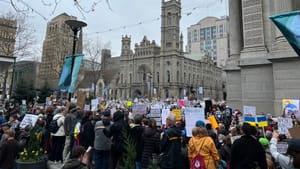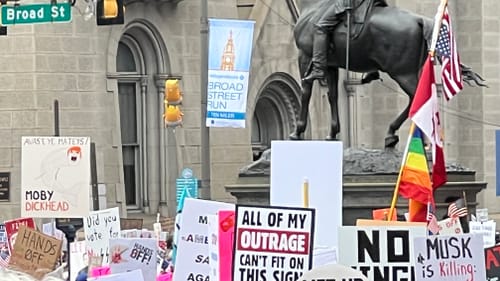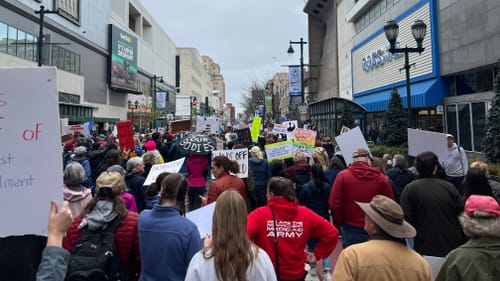Stay in the Loop
BSR publishes on a weekly schedule, with an email newsletter every Wednesday and Thursday morning. There’s no paywall, and subscribing is always free.
Disabled people are powerful activists. Do not discount us in the streets.
People criticizing “Hands Off” rallies are ignoring disabled protestors

Among thousands of people pouring around Philadelphia City Hall on Saturday, April 5, I noticed someone wearing a mask, a bandana covering their head, moving slowly with the help of a walker. A sign mounted on a stick taped to their walker simply said this: “Without MA & SSDI, I WILL DIE. This is EUGENICS.”
MA is Medical Assistance, also known as Medicaid. SSDI is Social Security Disability Insurance, which supports people who are unable to work because of a disability. Eugenics is the belief, whether tacit or loud, that the human race is better off if we eliminate certain people. Like disabled people. Like the people at the protest using walkers and wheelchairs. Like me.
The MAGA budget now before Congress, for all the denials of its supporters, will require drastic cuts to Medicaid to fund extended tax cuts for billionaires and corporations (CALL YOUR REPS). The deliberate chaos and mass layoffs courtesy of “DOGE” at the Social Security Administration threaten the collapse of social security payments. No doubt this is one reason Saturday’s protest drew what I noticed as a higher-than-usual number of disabled marchers. And who knows how many people like me, with non-apparent disabilities, were marching?
Bipartisan opposition
Saturday’s historic nationwide anti-Trump, anti-DOGE “Hands Off” rallies were mobilized by a broad coalition including the viral platform 50501, which advocates peaceful protest. By many accounts, there were more than 1,000 protests across all 50 states and up to five million demonstrators who gathered in major blue cities as well as small red towns. But within a few hours, there were naysayers—and not just on the right.
For example, Philly Solidarity Calendar, a popular local Instagram account (aligned with larger movements focused on Gaza), shared a statement on Sunday, April 6, that it framed as a “warning” to anyone who attended a "Hands Off" rally.
“It’s essentially activism stripped of its teeth,” the statement says of the protests. “You may have noticed that the rallies today were symbolic protests that took place outside empty government buildings that only lead to a sense of accomplishment without really doing much of anything.”
Criticizing the "Hands Off" coalition for being “state-approved” and cooperating with law enforcement, Philly Solidarity Calendar claims that Saturday’s protests were “designed to feel safe and inspiring,” and that we should “be honest about what’s performative and what’s revolutionary—and let’s move toward something real.”
Protests are never “safe” for disabled people
In leftist spaces, I often see claims that organizers who have their ducks in a row with permitting agencies are perpetuating a kind of faux, safe, or performative activism that stalls meaningful action against an unjust state. There are a lot of reasons I don’t agree with this, but today we’re talking about disabled protestors.

Disabled people in America, especially the majority of us at the intersection of other oppressions, know better than almost anyone else what it’s like to live under an unjust state. Claims that protests like Saturday’s march are safe or easy ignore the historic courage of disabled people.
What did it take for people using canes, walkers, or wheelchairs to attend Saturday’s march? What did it take for people with compromised immune systems to join crowds numbering in the tens of thousands during an ongoing pandemic? What did it take for deaf or blind people to join in and access the program? What did it take for people with chronic pain to get to the protest, march for many blocks, stand for speeches, and get home again? What did it take for autistic folks or others with sensitivity to noise, the stress of crowds, and high emotions?
When disabled people show up among the daily shitshow of ableism that is the United States of America, you better believe that we think it’s worthwhile to be there. And no matter how some folks frame "Hands Off," no protest is easy or “safe” for disabled people, even leaving aside the risk of pain, exhaustion, life-threatening infections, or other medical complications of just showing up.
The reality of protest and policing for disabled people
“I call into question the ‘safety’ case the left makes,” Philly author and organizer Sara Nović told me in an email. Nović, who is deaf, wrote True Biz (last year’s One Book, One Philadelphia pick). They point out that deaf people die at the hands of cops who don’t know the victim cannot hear commands. And even when interpreters are provided at a rally, deaf people are at higher risk “if and when things escalate,” Nović continues: “We cannot hear announcements, bullhorns, or communicate effectively with our fellow protestors.”
People with mobility challenges also face extra risks, Nović adds; they may not be able to move freely or quickly if and when police require it, at a protest or otherwise. According to the nonpartisan Center for American Progress (CAP), half of all people killed by law enforcement in the US are disabled. CAP also cites a 2017 study in the American Journal of Public Health finding that disabled people have a much higher probability of being arrested than nondisabled people, with the highest risk for Black disabled people, who have a 50 percent chance of being arrested by age 28.

In a 2021 article, CAP details reasons disabled people are targeted with excessive force or arrest. This could be because they act in ways officers deem strange or uncooperative, for example, because of seizures, cerebral palsy, autism, or psychiatric crisis. And disabled people detained by police can have their mobility aids, medication, masks, or communication devices confiscated, compounding the dangers they face.
According to CAP, more than 61 million people in the US have a disability, and more than one in four Black adults are disabled (but the linked pages for these citations, originally from the CDC, have been removed, probably because of ongoing purges to federal government material relating to DEI, which includes disability—one more reason to take to the streets). Disability lies at a historical nexus of racism, anti-trans hate, and many other oppressions, and the disability community (now under severe threat from the Trump administration) is the only marginalized group that anyone can join at any time.
“Early activists against authoritarianism”
And despite all this, throughout history, disabled people are excellent protestors. Ignore us at the peril of your movement.
“We do put our bodies on the line,” Nović says. “We organize quickly and can establish concrete demands.” The author points to protests like the 504 Sit-Ins, the Capitol Crawl, and many others led by disabled people who catalyzed huge social and political change. “We will keep doing it, even though it is not actually easy. You should join us and fight for us as we fight for you.”
That should go for everyone who opposes MAGA, including disenchanted Republicans, centrists, or liberals who have yet to turn out for a protest; progressives who often ignore disabled people; and leftists who criticize the current mass movement as “performative” or not “real”—in effect demeaning the herculean efforts of disabled people who turned out, and our history of positive change through protest.
“Disabled people are always early activists against authoritarianism in my opinion, in part, because we know how much there is to lose,” Nović says. Like the person standing with a walker in front of City Hall, the police, and thousands of their neighbors, to say that they are not just angry, they are facing death. If disabled people are taking to the streets, as we did in Philadelphia last weekend, it’s long past time to march with us, and then find more ways to join the fight.
Sign up for our newsletter
All of the week's new articles, all in one place. Sign up for the free weekly BSR newsletters, and don't miss a conversation.
 Alaina Johns
Alaina Johns